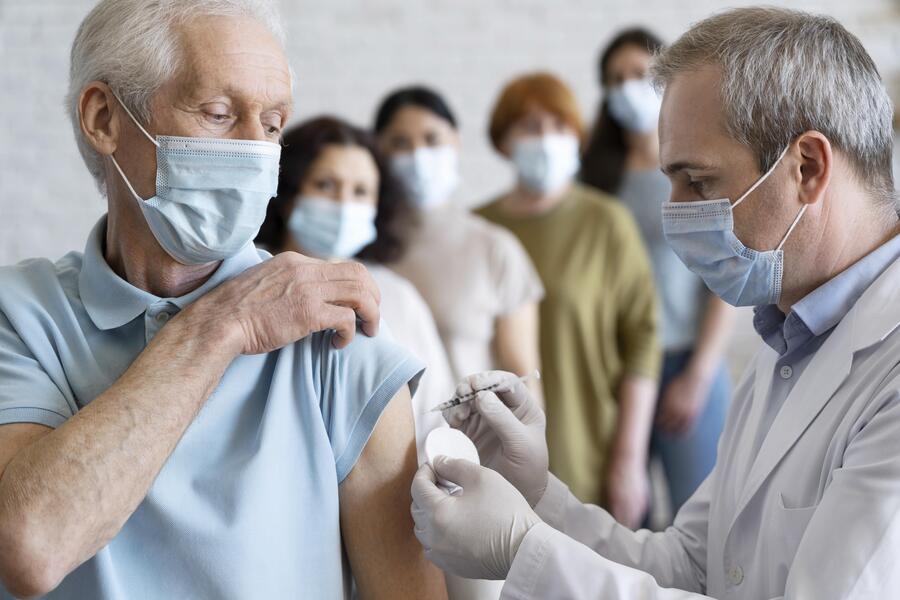Medically Reviewed by:
Dr Sarah has worked as a medical advisor with a total 10 years of experience in the pharma and clinical setting with wide exposure in clinical research and medical affairs.
Our bodies undergo various changes as we age, and our immune system becomes more vulnerable. It becomes increasingly important for us to take proactive steps to protect ourselves from potential health risks. One crucial way to safeguard our well-being is through vaccinations. Yes, vaccines aren’t just for children! In fact, there are important vaccines specifically designed for adults aged 50 and above, including one that helps prevent shingles.
You may be wondering why vaccines are necessary at this stage of life. Well, let’s break it down. As we grow older, our immune system weakens, making us more susceptible to certain illnesses. Diseases like influenza, pneumonia, and shingles can have severe consequences for individuals in their golden years. However, we can significantly reduce the likelihood of developing these conditions and their potential complications with the right vaccines.
So, what are these crucial vaccines that adults over 50 should consider? One of the most recommended vaccines is the shingles vaccine. Shingles is a viral infection characterised by a painful rash that typically affects older individuals who have previously had chickenpox. The vaccine protects this painful condition and can help minimise the risk of long-term complications.
In this blog, we will explore the essential vaccines recommended for people aged 50 and above, including the shingles vaccine. We will delve into why these vaccines are crucial for your health and discuss how they can help you lead a healthier and more fulfilling life as you age. So grab a cup of tea and join us as we dive into the world of adult vaccinations!
Influenza (Flu) Vaccine: Protecting against seasonal threats

Influenza, commonly known as the flu, poses a particular risk to older adults, often leading to severe complications and hospitalisations. To mitigate this risk, health authorities universally recommend an annual flu shot for everyone aged six months and older. This vaccine reduces the likelihood of contracting the flu and plays a crucial role in preventing associated complications.
Pneumococcal Vaccine: Guarding against serious infections
Pneumococcal disease can result in severe infections such as pneumonia, meningitis, and bloodstream infections. Health guidelines suggest a two-step approach for adults aged 65 and older: receiving the pneumococcal conjugate vaccine (PCV13) followed by the pneumococcal polysaccharide vaccine (PPSV23). These vaccinations are tailored to provide robust protection against different strains of pneumococcus bacteria, significantly lowering the risk of debilitating infections.
| A quick tip: Plan a small reward for yourself post-vaccination. Whether it’s a favourite treat or a relaxing activity, having something positive to look forward to can make the experience more positive. |
Shingles Vaccine: Alleviating the painful risk of reactivated viruses
Shingles, a painful rash caused by the reactivation of the varicella-zoster virus (which also causes chickenpox), becomes more prevalent with age. Adults over 50 are strongly recommended for the shingles vaccine, available as Zostavax or Shingrix. This vaccination effectively reduces the risk of developing shingles and its associated complications, including post-herpetic neuralgia, a persistent pain occurring after the rash has healed.
Tetanus, Diphtheria, Pertussis (Tdap) Vaccine: Boosting adult immunity
Protection from childhood vaccines may diminish over time, leaving adults susceptible to diseases such as tetanus, diphtheria, and pertussis (whooping cough). The Tdap vaccine serves as a crucial booster, providing protection against these potentially serious illnesses. It is recommended as a one-time substitution for the regular tetanus-diphtheria (Td) vaccine, reinforcing the body’s defences against these bacterial infections.
| Did you know? Certain medical conditions and treatments, such as cancer and immunosuppressive medications, can increase the risk of shingles. Individuals with compromised immune systems must discuss vaccination with their healthcare providers. |
Hepatitis B Vaccine: Safeguarding against viral liver infections
Hepatitis B, a viral infection affecting the liver, can lead to chronic liver disease, cirrhosis, and even liver cancer. Older adults who have not been previously vaccinated or have not completed the vaccine series are encouraged to consider getting the hepatitis B vaccine. This preventive measure is instrumental in reducing the risk of severe liver-related complications.
Measles, Mumps, Rubella (MMR) Vaccine: Closing the immunity gap
For individuals born in 1957 or later who have never had measles or received the MMR vaccine, it is crucial to consider vaccination. Measles can be severe in adults, potentially leading to complications such as pneumonia and encephalitis. The MMR vaccine provides robust protection against all three diseases, closing the immunity gap and contributing to the overall well-being of individuals and communities.
Remember, it’s always best to consult your healthcare provider before getting any vaccines, especially if you have specific health conditions or concerns. They can provide personalised recommendations based on your medical history and lifestyle.
In conclusion, it is crucial for individuals above the age of 50 to understand the importance of vaccines, especially when it comes to protecting against diseases like shingles. By staying up to date with the recommended vaccinations, you are safeguarding your health and preventing any potential complications that can arise from these conditions.
As discussed in this blog, vaccines such as the shingles vaccine can significantly reduce the risk of developing this painful and debilitating condition. It is essential to consult with your healthcare provider to determine which vaccines are best suited for you based on your medical history and current health status. Remember, prevention is always better than cure.
In addition to getting vaccinated, it is equally important to continue practising good hygiene and maintaining a healthy lifestyle. Simple measures like washing hands regularly, eating a balanced diet, exercising regularly, and getting enough sleep can go a long way in keeping your immune system strong.
Lastly, Ivory is a valuable resource where you can find more information about neurological conditions common among older adults. Take a step towards understanding your brain health better by visiting our website and exploring available resources. Remember, knowledge empowers us to take control of our well-being. You can also benefit from finding out your cognitive age and how it compares to your actual age.
Stay informed, stay proactive, and take charge of your health. With the proper knowledge and tools, you can lead a happy and fulfilling life even as you age gracefully.




